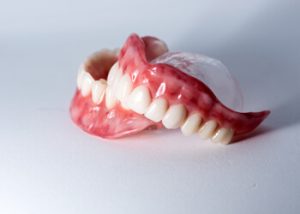How to Remove Plaque from Dentures? Denture Cleaning Tips

Practising daily denture care does a great job of managing plaque and bacteria levels in your mouth. Regular denture cleaning also keeps your prosthesis in good condition for longer. But, even though you clean your dentures daily, you might notice an accumulation of plaque develop that doesn’t respond to your usual cleaning techniques. This article will explain how to remove plaque from dentures and improve your oral care routine.
What Is Plaque, And Why Should It Be Removed?
Plaque is a thin, sticky biofilm that coats the surfaces in your mouth. It also covers your dentures when you wear them. Plaque is a combination of saliva, bacteria, and food acids, and it needs to be removed every day with thorough denture cleaning.
Accumulated plaque attracts more bacteria, which can compromise the integrity of any remaining natural teeth. It can also contribute to gum disease, as well as the development of sore spots and infections in your mouth.
How To Remove Plaque From Dentures?
Fortunately, there are a number of ways you can improve your denture care and remove plaque from the surface of your dentures. Denture wearers are at an advantage in terms of plaque removal because it is easier to clean all the surfaces and areas of a denture than natural teeth. It’s good practice to inspect your dentures on a regular basis to check for the presence of accumulated plaque. If you spot it, you could add some of these ideas to your denture cleaning regimen:
Try a baking soda solution
Mix a solution of two teaspoons of baking soda with one cup of warm water. Stir the baking soda with a spoon to help it dissolve, and leave your dentures in the cup overnight. The following morning brush the dentures thoroughly with a toothbrush, and any remaining plaque deposits should brush away easily, thanks to the enzymatic properties of the baking soda.
Use a vinegar solution
If your dentures do not have any metal components, you can try a vinegar solution for denture cleaning. Vinegar is very acidic, and this high acid content makes it quick and easy to remove plaque buildup. Place your dentures in a cup and cover them with apple cider or white vinegar and leave them overnight. Scrub them with a toothbrush the next morning before rinsing them under water.
Include hydrogen peroxide in your denture care
Hydrogen peroxide lifts plaque build-up from dentures surfaces and breaks it down. Place your dentures in a cup and cover them with hydrogen peroxide for a few hours or overnight. Brush them the next morning and rinse them thoroughly before putting them back in your mouth.
Have your dentures professionally cleaned
Make sure you visit your dentist as recommended to evaluate the health of your teeth and gums. Ask your dentist to clean your dentures at these appointments.
What To Avoid In Denture Care
 Even though deep soaking is effective in removing dental plaque from your dentures, there are some things you should not do:
Even though deep soaking is effective in removing dental plaque from your dentures, there are some things you should not do:
- Do not use very hot or boiling water for denture cleaning, as it can damage your prosthesis. It can also cause it to change shape, which affects the way it fits
- Do not use abrasive substances
- Do not use hard-bristled toothbrushes, as they can scratch and damage your prosthesis
- Do not use whitening toothpaste as it doesn’t affect the colour of dentures.
Denture care is an integral part of maintaining a healthy mouth and looking after any remaining teeth. To find out more about dentures or for help with how to remove plaque from dentures, please contact My Local Dentists for an appointment.
References
Denture care: How do I clean dentures?
https://www.mayoclinic.org/denture-care/expert-answers/faq-20058375
How to Remove Plaque from Dentures
https://www.tipsbulletin.com/how-to-remove-plaque-from-dentures/
